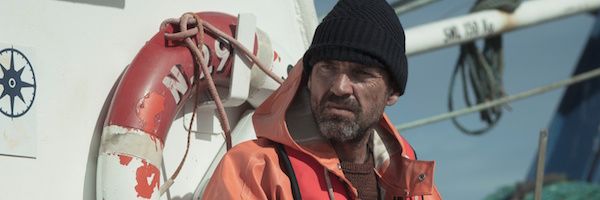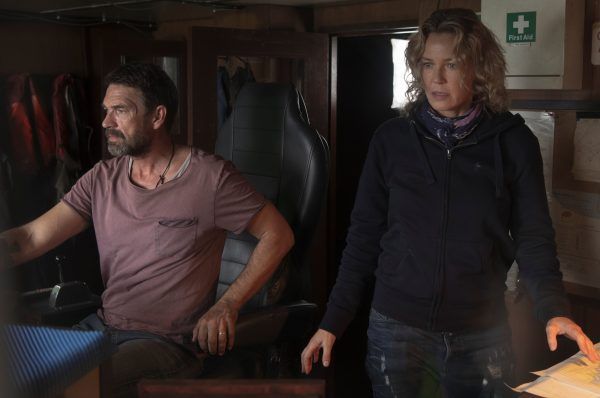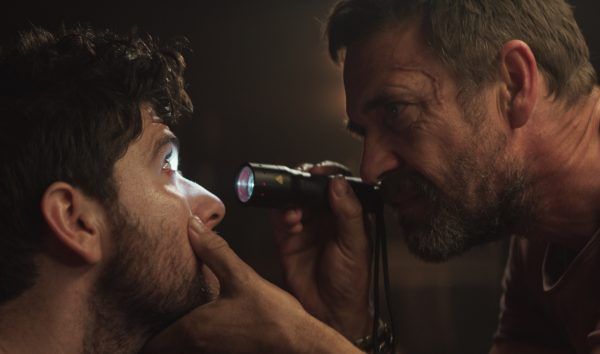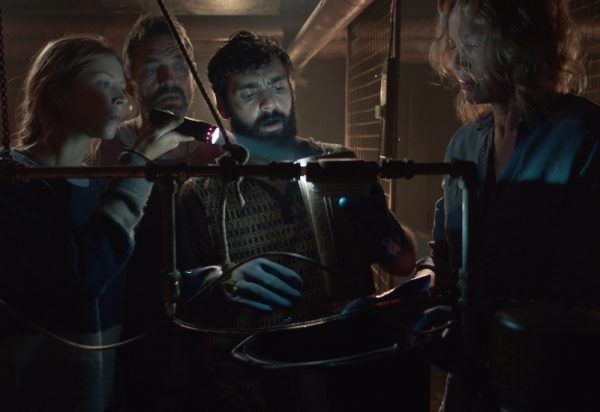From writer/director Neasa Hardiman, the indie horror film Sea Fever shows what can happen when a mysterious lifeform ensnares a fishing trawler out in the deep Atlantic with its crew on board. When marine biology student Siobhán (Hermione Corfield) has to endure a week on a boat whose close-knit crew starts to succumb to a strange infection that is taking them out, one by one, she attempts to understand its source and how to stop it.
During this 1-on-1 phone interview with Collider, Scottish actor Dougray Scott (who plays Gerard, one half of the couple in charge of the fishing crew, alongside his wife) talked about the very current themes that are present in Sea Fever, creating and setting the tone, what this kind of fisherman’s lifestyle is like, the experience of shooting on a ship and on confined sets to replicate that, and the female-driven set and story. He also talked about what drew him to The CW series Batwoman and what he’s enjoying about getting to play in that world, what he looks for in a role, and the project that he’s been developing for a few years now.
Collider: This is definitely a movie that really creeps you out, especially with the current state of the world.
DOUGRAY SCOTT: I know. It’s very relevant, isn’t it? A little uncomfortably so, for sure.
There were clearly some current themes in this that would already have been relevant, back when you read it and shot it, but it’s something even more relatable now. Did it seem that way, when you were initially read this script, and does it feel even scarier and more real to you now?
SCOTT: Sadly, it’s very, very current, with the themes of the film. Even when I read it, what’s happening in the environment, with the change in the political climate and the climate change, a film like this is incredibly relevant because we know what we’re doing to the world. There’s going to be consequences for the way that we behave, with regard to the environment and what we’re putting into their environment. It has to go somewhere, and realizing that, we’ve known for quite some time that the consequences are huge. Unless we stop and change the way that we conduct ourselves in the world, then the damage is gonna be interrupted irreparable and the world will be affected by it. So, when I read this script, I thought about all of those themes. Yes, it’s about a creature in the sea, but that is representative of the unknown and all of the things that we don’t know about the damage that we’ve done to the planet, whether it’s on land or in the sea. And we don’t know what the payback is gonna be, for the choices that we’ve made, over the years. When we are presented with a problem or a crisis like this, how do you deal with it? If you look at what’s happening today, how are we dealing with the crises of the coronavirus and the choices that we’re making? Are we being selfish, or are we making choices for the good of humanity? So, yeah, there’s a huge amount of parallels, at the moment.
So much of the success of a film like this comes from the mood and the atmosphere and the tension that it creates. Was that something that you were able to get, from the first time you read the script, or was that something that came out of conversations with the director?
SCOTT: It came out of spending time with the cast and conversations with (writer/director) Neasa [Hardiman]. She set the tone. She wrote the script, and she’s a wonderful writer. She also had a great vision for the story that she wanted to tell. It was very obvious, from very early on, what kind of master of the crazy that Neasa is. So, I just tried to listen to what she had to say and tried not to disappoint her. We spent a lot of time with a trawler crew and learned a lot from them. I was immersed in that world, for the time that I was in Ireland, and that helped, as well. We felt like we were a theater troupe, at times. The script had a lot of subtext in it and the actors loved being in each other’s company. The challenge was to make what is ostensibly a genre film, an emotional drama about isolation on a boat and the fractured nature of the character’s history, how these characters have dealt with their past, how their present situation collides with the choices that they’ve made in the past, and what that presents to others. I thought it was a wonderful script.
What did you learn about people who live this kind of lifestyle, and how did that inform the way that you played this character?
SCOTT: I knew a little bit about the trawler men’s world, having spent time with fisherman in Scotland. Your on your own for weeks at a time, and you don’t wash very much. You eat together, you sleep together – not sexually, but you share small quarters with each other – and you sleep very little. You sleep maybe an hour or two at a time, and then you’re up. It’s three weeks of intense work. It’s all hands on deck to get the catch, and then you’re all looking for this huge catch that’s gonna pay your wages for a month. It’s fiscally very precarious, the world of fishermen and trawler men. Once you understand the precarious nature of their livelihoods, then you understand the desperation that Gerard has, in his life and the choices that he makes, going after what he thinks is a huge school of fish, in an area that he shouldn’t be in because it’s protected. He does that, unbeknownst to the rest of the crew, because he’s desperate. He has to make a choice to save his family’s livelihood. So, the more you learn about that world, the more you understand the choices that the character makes.
What was it like to shoot some of this on a ship, and how did that compare to shooting on a set? Did it all create that feeling of it being very tight and confined?
SCOTT: Yeah. We spent quite a bit of time on the boat to get a sense of the space and confinement, and how you just can’t get away from each other. You’re in each other’s company, all the time. There’s not a lot of space, so you can smell each other and you eat with each other, all the time. The set was a great set that we had in the studio, but spending time on the boat certainly help give us an understanding of the practicalities of everyday life on a trawler ship, what it’s like, how difficult it is, and how dangerous it is.
This is a very female-driven film and the main characters are women, but at the same time, the story is told without being gender specific. Was that something that you noticed, at the time that you read this and were making it, or is that something that you’ve really thought about, after the fact?
SCOTT: I thought it was very female-driven when I read it, and I liked that. I thought it was really interesting that Freya was the boss, as Gerard said. That didn’t scare me. As a male actor, I’m a huge fan of working with female directors and actors. I’m not intimidated or, in any way, misogynistic about it. I enjoy, very much, working with women. I’m all for giving women a voice within the storytelling world of movies and television. For years, they’ve been sidelined and put in the background, and it’s important for movies to have main characters that are female. I think this was an ensemble piece, in many respects, but you have Freya and Siobhán, which is great.
What was it like to make this alongside Connie Nielsen?
SCOTT: I loved working with Connie. know, we all the single characters. We got on very well. She’s a wonderful actress. It was such a great, tight-knit group. Neasa was a wonderful director, and Hermione [Corfield] was terrific, as well. All of the actors were great. I had a wonderful time working with everyone.
You also have Batwoman, which returns to The CW with new episodes on April 26 and, in the meantime, new viewers can stream all of the episodes so far. What have you most enjoyed about getting to be a part of that TV series, exploring that character?
SCOTT: It’s fun. It’s a genre that I haven’t really had much experience with, but I’ve enjoyed playing the character of Jacob Kane on Batwoman, and that whole world. It’s a very different world. It’s fun, with a lot of action stuff. We’ll start shooting the second season, hopefully, in July, if everyone’s able to be back to work then. We’ll see. I’ve enjoyed it very much. It’s a great world to be involved in.
I love that there’s such a strong and interesting family dynamic on the show. What have you enjoyed about that aspect of it?
SCOTT: It’s interesting to play someone like Jacob because he’s an alpha male who’s in control of his family, or he wants to be in control of his family, and he also thinks he should be in control of Gotham City because he can protect them and that he’s the only one that they can trust. He doesn’t trust Batwoman. He hates Batwoman, in the same way that he hated Batman. He sees the Crows as being the only trustworthy and honorable group of people who can offer protection to Gotham City because the police force just isn’t strong enough and has been overtaken by corruption in the past years. He feels he’s the only person who can protect the city. So, you have that side of it, and then you have the relationship with his daughter, and how that manifests and changes, over the course of the season. He’s a fascinating character to get to play because you have the dad, but you also have the commander who’s very militaristic. He’s a product of his upbringing. He’s great fun to play.
At this point in your life and career, what do you look for in a project and what gets you excited about the work? Do you have your own personal wishlist, or is it more of an instinct when you read something?
SCOTT: I try not to repeat myself. I hadn’t done something like Batwoman before, so that was appealing. With Sea Fever, I hadn’t really done a character like that before. I develop my own projects, as well. I’m gonna do this Irvine Welsh thing next year. He wrong Trainspotting, and he adapted this novel of his that I’ve been developing for quite a few years, and how it’s been commissioned to film, so that’s exciting. I try to take risks and push myself, and I try not to repeat myself. That’s really the criteria that I have.
What’s it like to work on and develop a project, over a period of years. How do you stay motivated to keeping trying to get something made?
SCOTT: That’s a good question. You just have to be dogged. You have to be absolutely committed to doing so. If you believe in it, you have to be relentlessly clever, in order to get a story told that you feel deserves to be heard. That’s what’s happened with me and Crime, it’s called. I’ve known Irvine Welsh for years, and we’ve developed it together. Now, it’s been commissioned for TV. It’s been a long road, but you just have to be passionate. If you believe in something, you just keep on going until you’re dead.
Sea Fever is available On Demand and on Digital on April 10, 2020.




